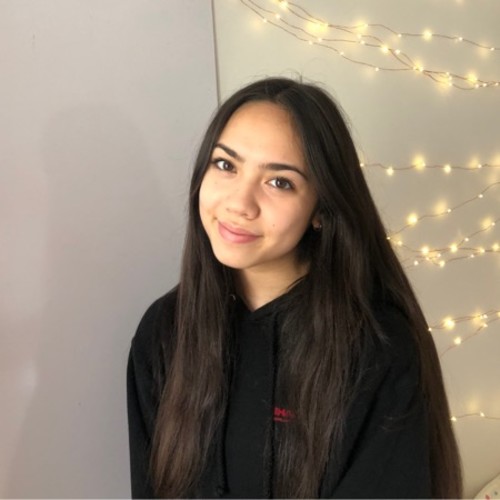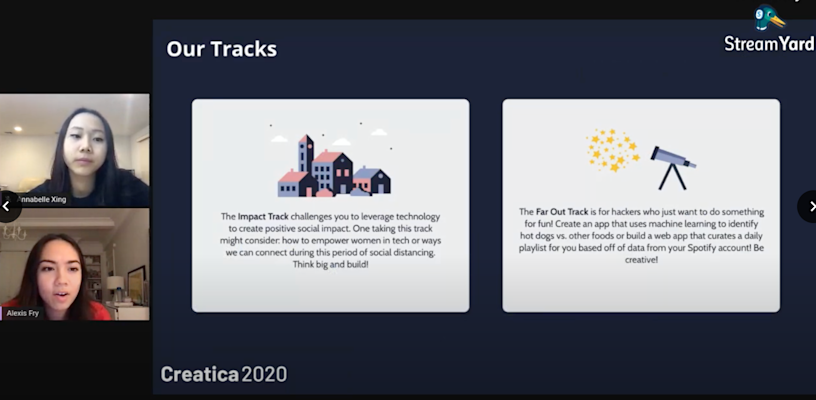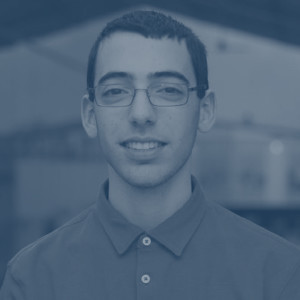Alexis Fry, 19

When not in class, Alexis is usually found in her school’s basement, tinkering away in the robotics lab. Her robotics community introduced her to hackathons and convinced her to attend HackMann in New York City. Upon entering the venue, Alexis realized that she was one of only four women at the entire event. Creating an all-women team, Alexis and her peers created a bot that used an AI algorithm to flag common terms or phrases used to sexually harass gamers on Discord servers. Alexis and her team were initially unfazed by the other male competitors, but upon presenting their project and seeing some snide laughter from others, Alexis felt a wave of intense anger that she will never forget. Despite the lack of respect from peers, the project won 3rd place at the event, and the experience was pivotal not only in her obsession with building a better world through technical product creation, but also in motivating her passion to make hackathons a more welcoming environment for gender minorities. Alexis continues to attend hackathons, and even co-organized a virtual HackMann event last summer, reaching over 150 high school and middle school students from around the world.
Alexis repeatedly wondered why she had an experience at her first hackathon that discouraged her from pursuing hackathons and even a future in tech. Her best answer was that the problem is structural: most hackathons are attended by men, planned by men, and cater to a male-dominated field. From this conclusion, she saw the potential to turn hackathons into an avenue for increasing diversity in tech—to revolutionize the hackathon space and create an accessible, encouraging pathway into tech for underrepresented minorities. It will take the dedicated work of driven individuals to reshape hackathon spaces, and Alexis believes she is one of them.
At hackathons, Alexis has worked with people she had never met before from different cultures around the world, allowing her to share her diversity with others and learn how to navigate collaborating with people from different backgrounds. As an aspiring AI researcher, Alexis notes such collaborative skills are imperative to developing fair and unbiased algorithms, and she hopes for a future where technical developers represent and support the diversity of our world. Alexis hopes to continue working in hackathon spaces so that MLH diversity reports reveal not only improvement in female and gender-minority attendance, but parity.
Knowing the potential benefits of such work and wanting to continue fighting discrimination in tech, Alexis co-founded weSTEM, an impact-driven startup dedicated to building the next generation of diverse tech developers, and founded Creatica, New York City’s first virtual hackathon for women and non-binary individuals in high-school and university.
While technological advancements push humanity forward, Alexis finds that it simultaneously widens existing inequities. She is especially interested in this dynamic for the future of AI, and how the lack of diverse representation in technology spaces can perpetuate discrimination and social inequity. While interning at Girls Who Code, Alexis researched the tangible impact that a lack of diversity has on technology spaces. She found data that suggests a lack of high school computer science education impacts the lack of representation in tech industries. Her most important finding was that AI systems can perpetuate biases based on gender or race, and can potentially be used to wrongfully justify racism through flawed, yet supposedly “objective,” technology. COMPAS is an AI tool for assessing criminal sentencing lengths, and is inherently biased, as it incorrectly labels Black defendants as future criminals at near twice the rate as white defendants. Such biased algorithms serve to cement discrimination into vital social structures, and are a great danger to the future of society. Alexis sees part of the solution to such problems as including more diverse developers who are aware of such biases that may be unconsciously integrated during the development cycle. weSTEM is Alexis’ attempt to fight and prevent a future defined by algorithmic bias by raising awareness and promoting developer diversity. Ultimately, she hopes to contribute to a future in which developers reflect the diversity of the world around us.
weSTEM has two sectors: impact and product. Impact initiatives focus on increasing accessibility to tech, and have directly impacted over 800 individuals around the world through a number of means. Some events include hosting TECHforALL, raising over $10,000 to provide 47 laptops to students in need, hosting after-school programs to teach girls around the Bronx coding fundamentals, and collaborating with Alexis’ high school to host an all-day virtual conference with panels of prominent women in tech for a global audience of over 200. weSTEM also has fellowships, with 7 fellows from 3 countries who teach free computer science workshops virtually for young women and non-binary individuals, having reached over 100 people so far. The product sector of weSTEM is its online community product, a centralized platform where young women can find tangible tech opportunities, from hackathons to scholarships to internships. The product sector is weSTEM’s current focus, and it is expanding internationally by partnering with hackathons abroad. While weSTEM is still in its early stages, its work has been recognized by the National Center for Women in Information Technology (NCWIT), the White House’s CSforALL, and Stanford’s she++ #include fellowship.
After talking with experienced organizers at gender-focused hackathons, Alexis assembled a team to bring Creatica to life—a hackathon hosted by weSTEM for young women around the world to build and innovate new technical products. She wanted to create an all-female hackathon space so that young women and non-binary individuals could have a different first hackathon experience than her own, contributing to a new, more diverse generation of tech. Alexis’s vision led to tangible impact, hosting an event with 8 workshops and tech talks, 8 challenges and prize tracks, and over 35 mentors. Creatica 2020 reached 456 hackers from over 18 countries, with 63% of attendees being first-time hackers. Alexis is excited for the future of Creatica, as it will continue annually, and planning for Creatica 2021 is already underway.
The many women of different ages and aspirations Alexis has met at hackathons have changed her life, shifting her perspective on both her own and the world’s future. Alexis heard unforgettable journeys from those who found success and power in the tech world despite being widely underrepresented in it, empowering her to pursue a future in tech. These stories expanded notions of her own identity, as she realized that her diversity is power, especially in planning and developing technical products. Alexis found warmth and support among the organizers of gender-focused hackathons: she learned the essential framework of organizing a gender-focused hackathon from the co-founder of WEHack UTD Medha; received ample support and advice from the executive director of TechTogether Fiona; and found structural and personal support from the MLH team that was instrumental in founding and organizing Creatica. Hackathons and the hackathon community changed Alexis’ perception of her own identity and aspirations and make her hopeful for the future, as she sees young hackers around the world passionate about building technical products for social impact.
Alexis’ favorite hackathon project was building Liveify, a web app that generates concerts or personalized Spotify playlists of live-performed songs based on the user’s preferences. Liveify was inspired by the COVID-19 pandemic putting the entertainment industry on hold, making it impossible for an artists’ fans to immerse themselves in a live concert experience. Working on this project was very interesting, as Alexis saw how it could easily scale up into a startup and successful product for entertainment in the time of a pandemic with virtual reality implementation. Virtual concert attendees could be deeply immersed in a concert experience, receiving merchandise and a VR headset with their tickets, and watching a live concert with other virtual attendees. Such an experience could be amazing for consumers, as well as help artists earn revenue in an otherwise stagnant time. Alexis found that some companies are trying to pull off this exact idea, but that the technical, virtual reality piece is challenging to maintain alongside user comfort; nevertheless, she loved the creativity and ingenuity of her project’s ideation phase, thinking about how to extend a hack into something usable and impactful for users around the world.
Quick Facts

Alexis Fry, 19

When not in class, Alexis is usually found in her school’s basement, tinkering away in the robotics lab. Her robotics community introduced her to hackathons and convinced her to attend HackMann in New York City. Upon entering the venue, Alexis realized that she was one of only four women at the entire event. Creating an all-women team, Alexis and her peers created a bot that used an AI algorithm to flag common terms or phrases used to sexually harass gamers on Discord servers. Alexis and her team were initially unfazed by the other male competitors, but upon presenting their project and seeing some snide laughter from others, Alexis felt a wave of intense anger that she will never forget. Despite the lack of respect from peers, the project won 3rd place at the event, and the experience was pivotal not only in her obsession with building a better world through technical product creation, but also in motivating her passion to make hackathons a more welcoming environment for gender minorities. Alexis continues to attend hackathons, and even co-organized a virtual HackMann event last summer, reaching over 150 high school and middle school students from around the world.
Alexis repeatedly wondered why she had an experience at her first hackathon that discouraged her from pursuing hackathons and even a future in tech. Her best answer was that the problem is structural: most hackathons are attended by men, planned by men, and cater to a male-dominated field. From this conclusion, she saw the potential to turn hackathons into an avenue for increasing diversity in tech—to revolutionize the hackathon space and create an accessible, encouraging pathway into tech for underrepresented minorities. It will take the dedicated work of driven individuals to reshape hackathon spaces, and Alexis believes she is one of them.
At hackathons, Alexis has worked with people she had never met before from different cultures around the world, allowing her to share her diversity with others and learn how to navigate collaborating with people from different backgrounds. As an aspiring AI researcher, Alexis notes such collaborative skills are imperative to developing fair and unbiased algorithms, and she hopes for a future where technical developers represent and support the diversity of our world. Alexis hopes to continue working in hackathon spaces so that MLH diversity reports reveal not only improvement in female and gender-minority attendance, but parity.
Knowing the potential benefits of such work and wanting to continue fighting discrimination in tech, Alexis co-founded weSTEM, an impact-driven startup dedicated to building the next generation of diverse tech developers, and founded Creatica, New York City’s first virtual hackathon for women and non-binary individuals in high-school and university.
While technological advancements push humanity forward, Alexis finds that it simultaneously widens existing inequities. She is especially interested in this dynamic for the future of AI, and how the lack of diverse representation in technology spaces can perpetuate discrimination and social inequity. While interning at Girls Who Code, Alexis researched the tangible impact that a lack of diversity has on technology spaces. She found data that suggests a lack of high school computer science education impacts the lack of representation in tech industries. Her most important finding was that AI systems can perpetuate biases based on gender or race, and can potentially be used to wrongfully justify racism through flawed, yet supposedly “objective,” technology. COMPAS is an AI tool for assessing criminal sentencing lengths, and is inherently biased, as it incorrectly labels Black defendants as future criminals at near twice the rate as white defendants. Such biased algorithms serve to cement discrimination into vital social structures, and are a great danger to the future of society. Alexis sees part of the solution to such problems as including more diverse developers who are aware of such biases that may be unconsciously integrated during the development cycle. weSTEM is Alexis’ attempt to fight and prevent a future defined by algorithmic bias by raising awareness and promoting developer diversity. Ultimately, she hopes to contribute to a future in which developers reflect the diversity of the world around us.
weSTEM has two sectors: impact and product. Impact initiatives focus on increasing accessibility to tech, and have directly impacted over 800 individuals around the world through a number of means. Some events include hosting TECHforALL, raising over $10,000 to provide 47 laptops to students in need, hosting after-school programs to teach girls around the Bronx coding fundamentals, and collaborating with Alexis’ high school to host an all-day virtual conference with panels of prominent women in tech for a global audience of over 200. weSTEM also has fellowships, with 7 fellows from 3 countries who teach free computer science workshops virtually for young women and non-binary individuals, having reached over 100 people so far. The product sector of weSTEM is its online community product, a centralized platform where young women can find tangible tech opportunities, from hackathons to scholarships to internships. The product sector is weSTEM’s current focus, and it is expanding internationally by partnering with hackathons abroad. While weSTEM is still in its early stages, its work has been recognized by the National Center for Women in Information Technology (NCWIT), the White House’s CSforALL, and Stanford’s she++ #include fellowship.
After talking with experienced organizers at gender-focused hackathons, Alexis assembled a team to bring Creatica to life—a hackathon hosted by weSTEM for young women around the world to build and innovate new technical products. She wanted to create an all-female hackathon space so that young women and non-binary individuals could have a different first hackathon experience than her own, contributing to a new, more diverse generation of tech. Alexis’s vision led to tangible impact, hosting an event with 8 workshops and tech talks, 8 challenges and prize tracks, and over 35 mentors. Creatica 2020 reached 456 hackers from over 18 countries, with 63% of attendees being first-time hackers. Alexis is excited for the future of Creatica, as it will continue annually, and planning for Creatica 2021 is already underway.
The many women of different ages and aspirations Alexis has met at hackathons have changed her life, shifting her perspective on both her own and the world’s future. Alexis heard unforgettable journeys from those who found success and power in the tech world despite being widely underrepresented in it, empowering her to pursue a future in tech. These stories expanded notions of her own identity, as she realized that her diversity is power, especially in planning and developing technical products. Alexis found warmth and support among the organizers of gender-focused hackathons: she learned the essential framework of organizing a gender-focused hackathon from the co-founder of WEHack UTD Medha; received ample support and advice from the executive director of TechTogether Fiona; and found structural and personal support from the MLH team that was instrumental in founding and organizing Creatica. Hackathons and the hackathon community changed Alexis’ perception of her own identity and aspirations and make her hopeful for the future, as she sees young hackers around the world passionate about building technical products for social impact.
Alexis’ favorite hackathon project was building Liveify, a web app that generates concerts or personalized Spotify playlists of live-performed songs based on the user’s preferences. Liveify was inspired by the COVID-19 pandemic putting the entertainment industry on hold, making it impossible for an artists’ fans to immerse themselves in a live concert experience. Working on this project was very interesting, as Alexis saw how it could easily scale up into a startup and successful product for entertainment in the time of a pandemic with virtual reality implementation. Virtual concert attendees could be deeply immersed in a concert experience, receiving merchandise and a VR headset with their tickets, and watching a live concert with other virtual attendees. Such an experience could be amazing for consumers, as well as help artists earn revenue in an otherwise stagnant time. Alexis found that some companies are trying to pull off this exact idea, but that the technical, virtual reality piece is challenging to maintain alongside user comfort; nevertheless, she loved the creativity and ingenuity of her project’s ideation phase, thinking about how to extend a hack into something usable and impactful for users around the world.
Quick Facts




